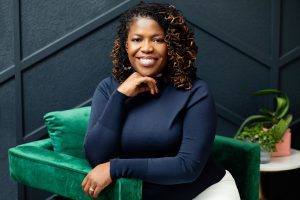
Black History Month (BHM) is an important time for acknowledgement and celebration of the critical contributions Black individuals and communities have made throughout the history of the United States. It should also be a time of reflection about the history of the enslavement of Black people and the long fight for equal rights that continues today. In this February’s Inclusive Culture Conversation we talk to Shayla Cannady, a PhD candidate in the Strategic Communication doctoral program at the Nicholson School of Communication and Media about her personal connection to Black History Month.
Shayla explains, “As the inaugural cohort’s first and only Black woman in the doctoral program of Strategic Communication at the University of Central Florida’s Nicholson School of Communication, I reflect deeply on the significance of Black History Month (BHM). BHM resonates within the core of my being, intersecting with my identity and experiences.”
1. Why is Black History Month (BHM) important?
“Black History Month (BHM) holds profound importance as it provides a dedicated platform for recognizing and celebrating the diverse experiences and invaluable contributions of Black individuals throughout history. It serves as a critical reminder of the ongoing struggles against systemic oppression and societal barriers faced by the Black community. As a 40-year-old educated Black woman and single parent, I find that it resonates deeply within me, intersecting with my identity and experiences. It offers a space to amplify Black voices, reclaim narratives, and affirm the richness and complexity of Black identity. Black History Month is not merely about honoring the past; it’s about acknowledging the resilience of those who came before us and reaffirming the inherent worth and dignity of every individual, regardless of race or background.”
2. How do you celebrate BHM?
“My family’s celebration of Black history extends far beyond the confines of the 28 (or 29) days earmarked by the nation’s government. We recognize that the impacts of blackness are pervasive and extend throughout our daily lives. From an early age, the teachings of Black history were seamlessly integrated into our family’s traditions, including annual travel, weekly worship experiences, reading, art, and literature. These practices are not just reserved for a specific month but are woven into the fabric of our daily lives. By actively engaging with Black history year-round, we foster a deeper understanding and appreciation of our heritage while instilling a profound sense of pride and resilience in future generations.”
3. What are some notable achievements that you’d like to share?
“When examining notable achievements, it’s essential to broaden our focus beyond individuals who often dominate national media attention, such as politicians, athletes, and celebrities. Instead, I find inspiration in the myriad inventions crafted by Black innovators, many of which are showcased in “A World Without Black People.” This story underscores the impact of Black inventors on our daily lives and highlights their often-overlooked contributions. From everyday conveniences to life-saving technologies, the inventions of Black creators have left an indelible mark on society. It’s imperative to spotlight and celebrate the achievements of these lesser-known heroes, whose ingenuity and creativity have enriched our lives and inspired future generations.”
4. What does BHM mean to you?
“Black History Month embodies the collective journey, resilience, and contributions of Black individuals throughout history. I navigate multiple identities that shape my experiences and perspectives. Raised in the South by parents who were veterans of the civil rights movement, I witnessed firsthand the remnants of Jim Crow segregation laws and the enduring impact of systemic racism. These experiences instilled in me an appreciation for the significance of education, resilience, and community support. Black History Month serves as a powerful reminder of the sacrifices made by those who came before me and commemorates their struggles, triumphs, and unwavering commitment to justice and equality. It represents a celebration of resilience and empowerment—a testament to the enduring spirit of the Black community.”
5. How can we become more inclusive?
“Becoming more inclusive requires a deliberate effort to honor the diverse identities and experiences within our communities. Navigating various aspects of my identity has given me unique insights into the importance of inclusivity. Fostering inclusivity begins with acknowledging and embracing intersectionality—the complex interplay of factors like race, gender, age, and family dynamics that shape individual experiences, and actively challenging stereotypes and biases that perpetuate discrimination and marginalization. By promoting cultural competence and fostering open dialogue, we can dismantle harmful stereotypes and cultivate environments of respect and value. By amplifying diverse voices and perspectives, we can challenge traditional norms and empower individuals to thrive regardless of their circumstances. Creating opportunities for meaningful participation and representation is essential for inclusivity, and requires empathy, understanding, and solidarity.”
6. What has been your biggest inspiration?
“My biggest inspiration stems from my parents, who navigated and grew up during the tumultuous era of the Civil Rights Movement. While it’s one thing to read about the experiences of that time, being raised by individuals who lived through it firsthand has profoundly shaped my worldview. Their sacrifices and endurance have paved the way for the opportunities and experiences I, and so many others, enjoy today. Despite facing immense adversity, they instilled in me the values of resilience, perseverance, and the importance of fighting for justice and equality. Their legacy of resilience, courage, and unwavering faith continues to inspire me every day as I strive to make a difference and honor the sacrifices they made for future generations.”
We thank Ms. Cannady for sharing her story and for her commitment to education and leadership in her community, her profession and at UCF.
By Majdulina Hamed.
Published to Nicholson News on February 9th, 2024.
If you have any news, accomplishments or highlights about your work or life, please be sure to share them with us, by emailing us at NicholsonNews@ucf.edu.